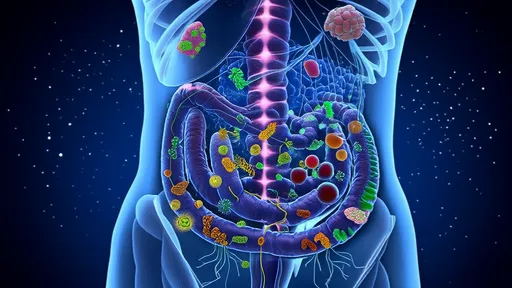The quest to understand and potentially extend human lifespan has led scientists down many fascinating paths over the decades. Among the most promising avenues of research involves telomeres - the protective caps at the ends of our chromosomes that have been called the "biological clock" of cellular aging. As research progresses, we're beginning to see how telomere length correlates with longevity and how interventions might one day slow the aging process.
Telomeres: The Cellular Timekeepers
Every time a cell divides, its telomeres become slightly shorter. These repetitive DNA sequences act like the plastic tips on shoelaces, preventing chromosomes from fraying or sticking to each other. When telomeres become critically short after many divisions, cells enter a state called senescence where they can no longer divide. This process contributes to tissue aging and dysfunction. Research across species shows that longer telomeres generally correlate with longer lifespans, though the relationship isn't perfectly linear in humans due to numerous other factors influencing longevity.
Elizabeth Blackburn, who won the Nobel Prize for her telomere research, describes them as both a biomarker and potential intervention point for aging. "Telomeres don't just passively shorten," she explains. "Their length reflects the dynamic interplay between cellular damage and repair mechanisms throughout life." Stress, inflammation, and oxidative damage accelerate telomere shortening, while healthy lifestyles and certain biochemical processes can help maintain them.
The Telomerase Breakthrough
In 1984, scientists made the groundbreaking discovery of telomerase - an enzyme that can rebuild telomeres. This raised immediate excitement about potential anti-aging applications, though the picture proved more complex than initially hoped. While telomerase is active in stem cells and certain proliferative tissues, most adult cells keep it suppressed. Reactivating it indiscriminately could promote cancer, as many tumors use telomerase to become "immortal."
Recent research has focused on finding ways to safely boost telomerase activity in specific cell types or for limited durations. Animal studies show promise - mice with enhanced telomerase activity live longer and show delayed onset of age-related diseases. Human trials using telomerase-activating compounds derived from astragalus root (TA-65) have demonstrated some ability to lengthen critically short telomeres in immune cells, though the long-term effects remain under study.
Lifestyle Factors and Telomere Maintenance
Perhaps the most immediately applicable discoveries involve how daily choices affect telomere length. Large epidemiological studies reveal that people who exercise regularly, manage stress effectively, and eat antioxidant-rich diets tend to have longer telomeres than their chronological age would predict. The Mediterranean diet in particular shows strong correlations with telomere maintenance, likely due to its anti-inflammatory effects.
Chronic stress appears particularly damaging to telomeres. Studies of caregivers and individuals with anxiety disorders show their telomeres shorten faster than average. Mindfulness practices like meditation may counteract this effect - long-term meditators often have telomere lengths comparable to much younger individuals. The biochemical pathways connecting psychological states to cellular aging are becoming clearer, revealing how stress hormones like cortisol accelerate telomere attrition.
Gene Therapy Approaches
More radical interventions are being explored in laboratories. In 2012, researchers at the Spanish National Cancer Centre used gene therapy to extend telomeres in adult mice, reversing signs of aging in multiple organs. The treated animals lived 24% longer on average without increased cancer rates. While human applications remain distant, this proof-of-concept shows that telomere extension can produce measurable lifespan benefits.
Startups like BioViva have begun testing telomerase gene therapies in humans, though these remain highly experimental and controversial. More mainstream researchers advocate for cautious progress, focusing first on using telomere extension to treat specific age-related conditions rather than pursuing general life extension. Clinical trials are underway for applications like improving immune function in the elderly and treating degenerative lung diseases.
Beyond Length: Telomere Quality Matters
Emerging research suggests telomere length tells only part of the story. The structural integrity of telomeres appears equally important - damaged or dysfunctional telomeres can trigger aging responses even when they're technically long enough. Scientists are developing new ways to assess telomere "health" beyond simple length measurements, examining factors like the protective protein cap structure and susceptibility to oxidative damage.
This complexity helps explain why some individuals with relatively short telomeres remain healthy into old age, while others with longer telomeres develop age-related diseases prematurely. It also suggests future anti-aging therapies may need to address telomere quality rather than just length. Compounds that stabilize the telomere structure or enhance its repair mechanisms could prove as important as those that simply extend it.
The interplay between telomeres and other hallmarks of aging forms another active area of investigation. Telomere dysfunction appears to accelerate mitochondrial decline, epigenetic changes, and cellular waste accumulation - all key aspects of the aging process. Comprehensive anti-aging approaches will likely need to address these multiple interconnected systems rather than focusing on telomeres alone.
Ethical Considerations and Future Directions
As telomere science progresses, it raises important ethical questions. Potential life-extending therapies would have profound societal impacts, from retirement ages to population growth. There's also the risk of creating health disparities if such treatments prove expensive. Most researchers emphasize that current goals focus on increasing "healthspan" - the period of life spent in good health - rather than simply extending lifespan at any cost.
The coming decade will likely see more telomere-related interventions entering clinical trials, particularly for specific age-related conditions. While a true anti-aging pill remains elusive, the growing understanding of telomeres has already changed how we view the aging process - not as an inevitable decline, but as a malleable biological phenomenon that we may eventually learn to modulate. For now, the best evidence suggests that lifestyle choices supporting telomere maintenance offer the safest way to potentially slow cellular aging.
From basic science to potential applications, telomere research continues to yield surprising insights about the fundamental mechanisms of aging. What began as curiosity about chromosome tips has blossomed into one of the most promising frontiers in biomedical science, offering hope that aging itself may someday become a treatable condition rather than an inescapable fate.

By /Jun 7, 2025

By /Jun 7, 2025

By /Jun 7, 2025

By /Jun 7, 2025

By /Jun 7, 2025

By /Jun 7, 2025

By /Jun 7, 2025

By /Jun 7, 2025

By /Jun 7, 2025

By /Jun 7, 2025

By /Jun 7, 2025

By /Jun 7, 2025

By /Jun 7, 2025

By /Jun 7, 2025

By /Jun 7, 2025

By /Jun 7, 2025

By /Jun 7, 2025

By /Jun 7, 2025

By /Jun 7, 2025

By /Jun 7, 2025